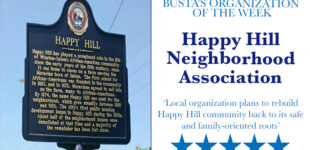Commentary: Will the new Salem Parkway boost downtown business?
Algenon Cash

By Algenon Cash
Just over a week ago, the new Salem Parkway, formerly known as Business 40, opened six months ahead of schedule and to much fanfare. Many local residents and business owners gathered on the newly constructed two-lane freeway to celebrate. Downtown business owners blamed the closed road for many of their woes in the center city.
In November 2018, a 1.2 mile long section of Business 40 was closed for significant reconstruction and to address substandard exits, entrance ramps, and bridges. The total investment for the improvement project was $99.2 million and it was completed six months ahead of schedule. Many of us (including me) hoped the state would use the opportunity to widen the road to be proactive about future growth in the community – in the end state officials decided it would be too costly to convert the road to three lanes.
Personally I’ve felt many of the downtown businesses that faulted the road closure for their sales declines have only been considering one variable amongst many. So, I’ve been spending time meeting with a handful of downtown business owners to survey whether they have seen any increase in sales or customer traffic since the new parkway opened.
Not only have they not seen any rebound, but some even reported sales for the current month are trending lower than sales for the same period last year – undoubtedly this winter season has been mild compared to 2019. Typically, weather can be a huge driver for consumer- centric businesses such as retailers, coffee shops, restaurants, bars, and breweries.
I have no doubt the road closure played a key role in hurting downtown business, but I believe it’s very important that we carefully look at a number of other wavering economic indicators preventing downtown businesses from returning to normal growth.
One reality that many downtown business owners must accept is there has been an explosion of new apartments, hotels, restaurants, bakeries, coffee shops, bars, and breweries in the central business district. So many that I’ve started to question does enough real demand exist to support all the risk-taking entrepreneurs behind the ventures.
For example, I chatted with a new downtown resident, who she gleefully told me how a recently opened downtown apartment complex is offering a $2,000 signing bonus to new tenants. Keep in mind that I didn’t say a $2,000 rental concession, but literally the property manager is handing out Visa gift cards to anyone who signs a lease. That should make plenty of market observers nervous because it points to a clear emerging weakness in the downtown rental market.
Most downtown businesses rely heavily on consumers having discretionary income to make buying decisions. For example, if you have money left over after paying critical bills, then you’re more likely to catch a performance, dinner and drinks in downtown. If you don’t, then you may opt to Netflix and chill at home with a pizza and beer from a nearby grocery store.
Ultimately the lack of new private sector job growth in the city is harming not only downtown businesses, but the city at-large. Private sector employment is barely higher than it was in 1999, which was more than 20 years ago. Winston-Salem has an average hourly wage of $22.05, about 12% below the national average of $24.98 – also lower than neighboring regions – Charlotte ($24.52) and Raleigh ($25.28).
Average hourly wages can be easily misconstrued because of large outliers. I prefer to focus on median wages because they are not as easily manipulated by high income earners that often work in white collar jobs. The median hourly wage in Winston-Salem is $16.87 an hour, almost $2 below the national average.
Hanesbrands Inc. will be the only publicly-traded company based in Winston-Salem once Primo Water Corp. completes its sale. Over the past 20 years, we have watched 14 corporate headquarters depart the city for a variety of reasons.
Keep in mind, when these companies leave, we don’t simply give up ordinary jobs, but we also lose members of the executive suite – CEO, COO, and CFO – and these people often have high discretionary income that supports a variety of businesses in the city. Not to mention these high-profile companies attract people into town, which has a direct impact on the hospitality sector’s ability to thrive.
We have a clear strength when it comes to recruiting young people to our community – we have five leading educational institutions in our backyard – Wake Forest University, Winston-Salem State University, Salem College, North Carolina School of the Arts, and Forsyth Tech.
Wake Forest enrolls four out of its five students from out of state. So, we have no barriers preventing us from attracting young talent, but local economic conditions result in a low retention of rising leaders.
SmartAsset recently announced a list of states where Millennials are moving and North Carolina ranked #5, with a net migration of 18,824, and beat other southern states such as Georgia. Look deeper at the actual cities attracting Millennials – Charlotte (#6), Greensboro (#18), and Raleigh (#23) – completely absent from the list is Winston-Salem.
This inconvenient truth further exacerbates the lack of growth for consumer driven businesses located in Winston-Salem. Millennials spend a larger portion of their income on retail, restaurants, and breweries, but we don’t seem to be too adept at keeping them in our community.
*60% of millennials spend more than $4 on a single coffee.
*70% of millennials will spend extra to eat at the hip restaurants in town.
*69% of millennials buy clothes for reasons beyond basic necessity.
City leaders must acquire a laser focus on recruiting corporate headquarters to raise the overall prestige of the city. We must figure out innovative ways to jumpstart private sector job growth to generate more discretionary income to bolster consumer focused businesses. We need more workforce development initiatives to raise the median wage. But most importantly we must give the younger generation a substantive reason to stay in the city to support local businesses and build families – both make powerful contributions to the community’s tax base.
Algenon Cash is a nationally recognized speaker and the managing director of Wharton Gladden & Company, an investment banking firm. Reach him at acash@algenoncash.com















